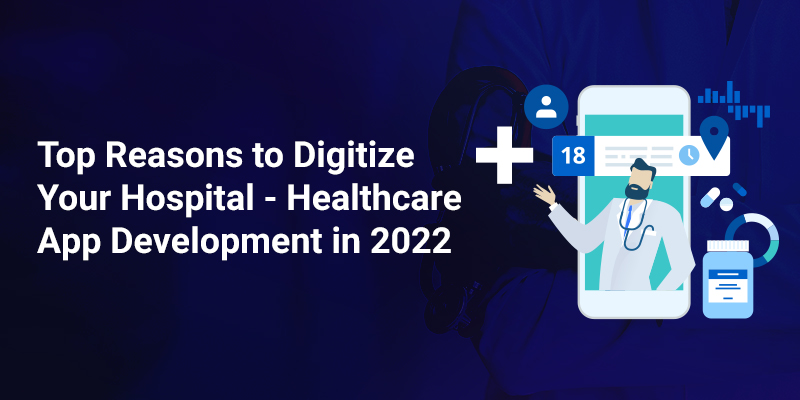If you are in the healthcare business, it is essential to keep up with digital transformation in healthcare. However, it is not easy as it chimes and can feel overwhelming.
Determining the right Healthcare Mobile App Development or Custom Healthcare Software Solution worth investing in and finding the right team to work on them is often the most challenging part. Acclimating to the digital age requires a transition towards a reliable, flexible, yet risk-taking mindset.
On the other side, it signifies leaving behind obsolete business processes and counting that disruption will deliver significant results.
The U.S. healthcare market is vast, and national health spending will touch $5.6 trillion by 2026. There is still ample time for all healthcare businesses in the U.S. to get accustomed to the latest healthcare technology to drive growth. In order to touch new heights, it is essential to let go of old business processes and understand the modern healthcare landscape.
Technologies such as AI, Wearables, and Telehealth offer better care. Likewise, doctors can streamline their workflows using artificial intelligence-powered systems.
Here’s a more refined look at the shape of digital transformation in healthcare in 2022:
On-demand Healthcare – Why the Sudden Rush?
With digital innovation knocking the doors of the healthcare industry and patients seeking on-demand healthcare because of their busy schedules, healthcare is entering a new era of the digitalization age.
Smartphones and other devices that aid information access from the comfort of the couch is the trend predicted for the upcoming times. According to a survey report, about 55% of web browsing across the globe is done on mobile devices.
Smartphones are your best bet. Smartphones fall first to reach them as 75% of U.S. residents own a smartphone. Therefore, the first approach is to target your audience by identifying where they gather and contact them on their preferred platform. With 4 billion and more people globally on the Internet, you can start to see the potential that digital transformation in healthcare offers.
According to a survey report, patients are going online to fetch medical knowledge for the following reasons:
- 45% of research doctors
- 40% research hospital and medical facilities
- 75% book medical appointments
On the other hand, on-demand healthcare is also guided by the development of the ‘gig’ economy, in which freelance professionals in diverse orders employ themselves out per job or ‘gig,’ instead of tethering themselves to one company.
Big Data in Healthcare
Big data collects essential details about a business from social media platforms, eCommerce websites, online transactions, and financial transactions. It derives the patterns and trends for future use in healthcare.
In the healthcare industry, big data provides several unique advantages, including:
- Through patient record analysis, it lowers the rate of medication errors. The software helps identify inconsistencies between a patient’s health and drug prescriptions, alerting health professionals and patients.
- Patients who are rushed to emergency rooms account for 30% of visits. Such patients can easily be identified and kept at bay by providing the proper medications and suggestions through Big Data analysis.
- The adequate staff to deal with patients can be accomplished with big data’s predictive analysis. It helps hospitals to estimate future admission rates.
Virtual Reality in Healthcare
VR is a vital communication channel in the 21st century as it enables hospitals to get a better sense of their patients’ needs and virtually engage them. Its myriad of applications is profoundly transforming the way of patient care.
Everyone is betting on VR, from startups to pharma giants, and there are numbers to back them up. Virtual Reality headsets could also encourage wearers to wield and help children with autism learn how to navigate the world.
Every healthcare company planning its digital marketing strategy should consider investing in this technology.
Wearable Medical Devices
In the new age, medical devices have started to provide hospitals and clinics with patient conditions and medication information through wearable technology. As a result, patient care has improved and vice versa; the health information can be accessed on the go, frequently. Therefore, wearable medical devices are considered as one of the major digital transformations.
The wearable medical device market will likely go beyond $28 million by 2023—an incredible growth from almost $8 million in 2017. Some of the notable wearable medical devices included Heart rate sensors, Exercise trackers, Oximeters, etc.
Artificial Intelligence
Artificial intelligence (AI) represents the epitome of medical innovation and is more than an innovation. Besides the healthcare industry, other industries are also enthusiastic about investing millions in it. According to a recent report, the healthcare AI-powered tools market is anticipated to surpass the $33 billion mark by 2025.
The friendly Moxi American nurse robot is an excellent example of AI’s contribution to the medical world. Currently, chatbots and virtual health assistants play a key role in the healthcare space. The global healthcare chatbots market is anticipated to touch $314 million by 2023 compared to the $120 million in 2018.
Wrapping Up
Are You Planning To Invest in Healthcare Mobile App Development or Custom Healthcare Software Solution?
Caregivers must go digital to drive new patients and engage the existing ones. But, there are a few things that you need to consider before developing a custom healthcare software solution or investing in a healthcare mobile app development.
Whatever be your requirement, ensure that you are incorporating the latest technology. Besides that, it would be best to introduce the newest APIs and telemedicine into your app to make it successful.
Take a free consultation with our expert to ask about healthcare app development timeline, cost, or other doubts.
